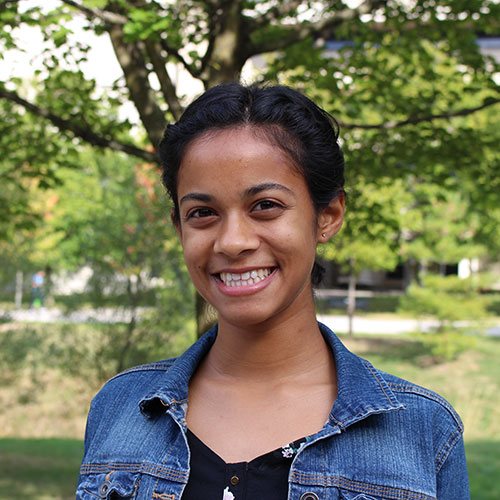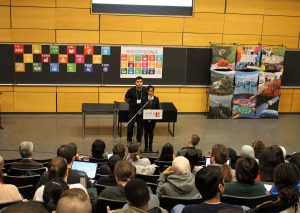 This blog post was written by Aliya during her 4th year in the Environmental Management stream.
This blog post was written by Aliya during her 4th year in the Environmental Management stream.
Paying for school is often one of the many challenges students face during their academic career. However, there are many opportunities within York that help students pay for their academic fees. Paying for school isn’t always easy, but here are some ways I was able to pay school fees and still manage my time holistically.
Scholarships

Aliya in her first year
Applying for scholarships while I was still in grade 12 really helped me pay for my first year in university. As soon as I accepted my offer to the BES program, I immediately got emails from the Faculty about entrance awards I was eligible for. Most of the entrance awards for students going into first year were fairly easy to apply for. I applied for the George and Helen Vari Entrance Award which was worth $2,500. I had to fill out a financial need form which basically just asks you how much money you need to pay for all of your expenses during your first year in school. Some entrance scholarships ask about your financial need, where others also ask for an essay about your community involvement. There are also other scholarships that are just based off of your final grades. Whatever the type, I highly recommend applying for entrance awards in grade 12 because it only gets more competitive during university.

A plaque listing the HSBC award recipients
In my third year, I also applied for the HSBC Award which was for current BES students and worth $5,000. I had to write a short essay about my community involvement related to my field and provide references. Current students often forget that there are a lot of scholarships and awards available and don’t apply, but I highly recommend keeping track of these to help you pay for school. There are also scholarships that are specific for your area of study, for example I also received the Alectra Award which is for students who are studying sustainable energy and innovation.
As some of these awards' applications ask about your community involvement, volunteering really helps improve your chances when applying. During my university career, I volunteered with Forests Ontario and the City of Toronto, Parks and Forestry which showed that I was making an effort to give back to the community and make connections in my field of interest.
Part time jobs
One of the hardest parts of trying to balance school and everything else in my life was working a part-time job at the same time. During my BES degree, I worked 2 part-time jobs. One of these job was working at my community centre pools as a lifeguard, swim/aqua fitness instructs, lifesaving coach and deck supervisor. Since these community centres were close to home, it was easy for me to commute from home to work and then school by taking the bus and later on when I got my car.

Aliya at the UNSDG training
I also started working part time in the summer of 2018 for the Faculty of Environmental Studies as a work/study student. I would do things like assist with event planning such as Fall Campus Day, the UNSDGs' conference, Change Your World Conference and office support. My shifts were usually just once a week and I would work around 5 hours per shift.
Along with being paid to help me fund my studies, these roles also gave me good references and skills that I developed over the years which can often be showcased when applying for scholarships too. As well, working in Environmental Studies really helped me stay on top of applying for scholarships because I was working with people who always promote them.
Overall Tips
Paying for school is a big responsibility in a student’s life and it can be stressful, but it is important to ensure that you can balance your school and work life. Some things I recommend to stay on top of things are:
- Write down all of the deadlines for scholarships and awards applications along with the information you need to apply so that you had time to fill out all of the forms properly.
- Find out the contact information for the people who oversee the application processes (part time job or scholarship wise) so if you have any questions on how to submit, you can reach out to them.
- Contact references for jobs and scholarships beforehand. It comes off as unprofessional when you ask a reference to write you a letter the night before your application is due.
- Volunteer in a field of your interest that gives back to the community and assists with your skill development.
- To the students who are eligible for OSAP, I highly recommend applying because it really did help me pay for school and ease my mind when it came to financial decisions.
There are so many opportunities for students to get help when paying for school. Although it may seem like the most difficult thing, it is attainable, and the hard work and dedication will definitely pay off!

